I read the novel in 1968 when I was seventeen. It's impossible to remember a lot of details of the story. But I do remember going to see the film during its initial release and being disappointed by the way the story was portrayed on the screen. I guess my image of Joe Buck was much different than the way Mr. Voight played him. With subsequent viewings of the film, my feelings changed. I was able to appreciate the film for itself and see its many outstanding qualities rather than comparing it to the superiority of the novel. While reading Frankel's book, I watched the film again. I even considered finding a copy of the novel and rereading it. But by the end of SHOOTING MIDNIGHT COWBOY, I found myself a little overwhelmed by the sad lives of Joe Buck, Rico Rizzo, and their creator, James Leo Herlihy. I think I've had quite enough of MIDNIGHT COWBOY and the mean, lonely streets of New York City. At least for a while. That said, this book is essential reading for fans of the movie. Just realize that you'll probably need some cheering up after you've finished reading it.

FILM REVIEWS, COLLECTION UPDATES, COMMENTS ON CINEMATIC CULTURE
Tuesday, May 18, 2021
BOOK REVIEW: SHOOTING MIDNIGHT COWBOY by GLENN FRANKEL (2021)
Glenn Frankel has written an exhaustive, and somewhat exhausting, account of the making of the classic film MIDNIGHT COWBOY (1969). To give an idea of just how exhaustive the book is, the author doesn't get to the actual film set until the fifteenth chapter, the middle of the book. Before we get there, Frankel takes us on a long path of preparation by detailing the lives of all the key players in the film's history. He begins with James Leo Herlihy, who wrote the novel that was published in 1965. We learn about his working class upbringing in the Midwest, his struggles to be established as a writer, and his coming to terms with his gay sexuality. Frankel continues with similar background stories of director James Schlesinger, screenwriter Waldo Salt, the producers, casting director, and many other members of the film crew. Eventually we learn how stars Dustin Hoffman and Jon Voight got involved, as well as other members of the cast. One of the best things about the book, as in other books of this kind, is the inclusion of quotes from the actors and actresses involved. We learn quite a bit about the relationship between Hoffman and Voight and how they worked together. Jennifer Salt, who had a supporting role in the film, is quoted throughout concerning her father, Waldo Salt, and her romantic connection to Voight during the film's production. Frankel also gives us a lot of insight into New York City, its unique culture, and its importance to the film.
Subscribe to:
Post Comments (Atom)



No comments:
Post a Comment